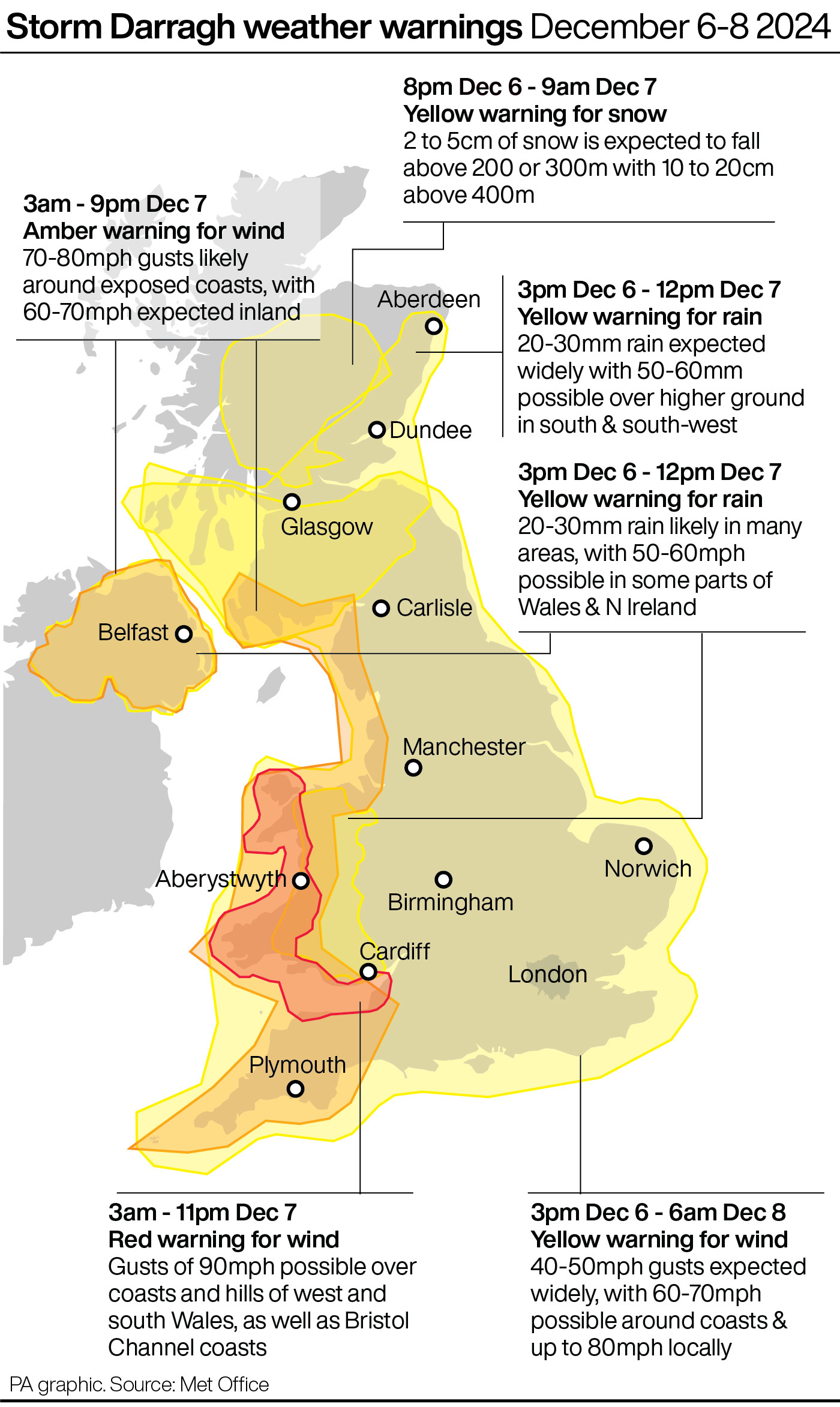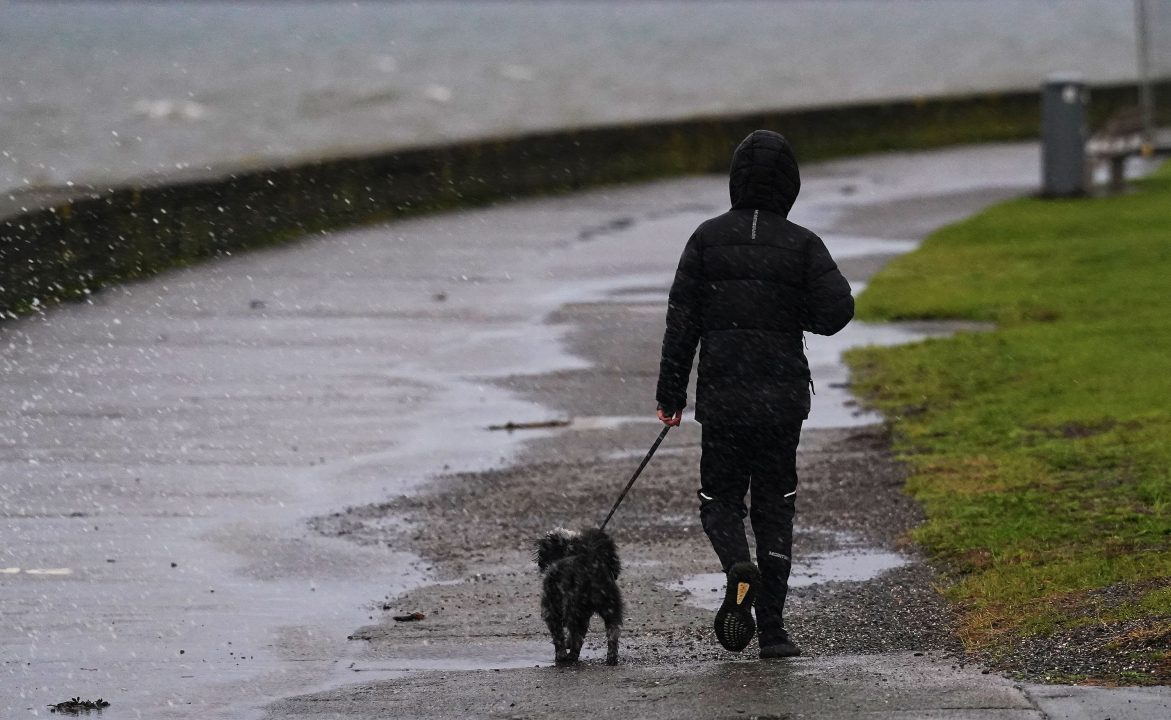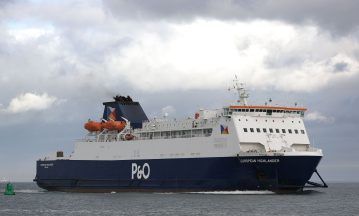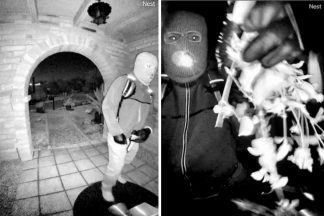Gusts of 93mph have been recorded as Storm Darragh hit the UK.
Millions of people have been warned to stay indoors, thousands are without power, and trains have been cancelled as the Government’s “risk to life” alert came into force.
The emergency alert came into effect at 1am on Saturday and was sent to people within the area covered by the Met Office’s rare red warning for wind in parts of Wales and south-west England.
It was the largest use of the warning system yet, with the alert urging residents to avoid driving and to “stay indoors if you can”.
Speaking to Sky News, Business Secretary Jonathan Reynolds described the storm as a “challenging situation”.
He added: “About three million homes will have had the emergency alert system to their mobile phone. I would just encourage anyone who has had that to follow the advice.”
 PA Media
PA MediaHe added: “Where you can, stay inside, don’t put yourself at risk, and just follow the advice at all times.”
The Cabinet Office’s emergency alert system sent a message to every compatible mobile phone in the impacted areas, containing information about the red warning and guidance on how to stay safe.
Mobile phones made a loud siren-like sound even if they were set on silent, with the sound and vibration lasting for about 10 seconds, although some people claimed they did not receive it.
The Met Office confirmed to the PA news agency that wind gusts of up to 93mph were recorded overnight in Capel Curig in North Wales, with 92mph in Aberdaron on the Llyn Peninsula.
Winds in other parts of Wales topped 80mph, while gusts of up to 77mph were recorded in Northern Ireland and south-west England, the forecaster said.
Tom Morgan of the Met Office said that as of 7am the storm was at its peak, but higher wind speed totals are “possible” later in the morning.
The centre of the storm, meaning winds are calmer, was across north-east England.
Thousands of people in Northern Ireland, England and Wales were left without power.
The Energy Networks Association said around 86,000 homes in England, Scotland and Wales were without power as of 9am.
A spokesperson said around 385,000 customers were reconnected overnight, with more than 1,000 engineers ready to be deployed.
National Grid said that as of 8am more than 55,000 customers were off supply across the South West, south Wales and the west Midlands due to Storm Darragh.
It said the majority of these were in south Wales.
Meanwhile, around 376,000 customers have had their power restored by its teams since the start of the storm.
A note on the Northern Ireland Electricity Network’s website said the authority was unable to provide estimated restoration times.
“Due to the number of faults we are currently experiencing on the network, we are unable to provide an estimated restoration time for your electricity supply at this time,” it read.
“We are working to restore supplies as quickly and safely as possible.”
National Highways said both the Prince of Wales Bridge, M4 and the Severn Bridge, M48, which connect South West England to Wales were closed due to strong winds.
Network Rail Wales said owing to a fallen tree, all train services on the North Wales Coast Line are suspended until further notice.
National Highways advised the QEII Bridge at Dartford Crossing in England’s South East had also been closed due to strong winds.
The Merseyside Premier League derby between Everton and Liverpool at Goodison Park that was due to kick off at lunchtime was postponed.
The Met Office issued the red weather warning – the most serious type – on Friday for wind, meaning dangerous weather is expected and people are urged to take action to keep themselves and others safe.
The warning, which has led to the cancellation of events including Christmas attractions, is in place from 3am to 11am on Saturday.
The Met Office warned of “damaging winds” with gusts of 90mph possible over the coasts and hills of West and South Wales.
Forecasters say the strongest winds will begin to ease from late morning.
A separate amber warning covering a larger stretch of the west coast of the UK, stretching from southern Scotland to Cornwall, and Northern Ireland is in place from 1am until 9pm.
Flying debris and falling trees could pose a risk to life while large waves and beach material could be thrown on to coastal roads and seafronts.
There could also be damage to buildings and homes, with roofs blown off and power lines brought down, as well as power cuts affecting other services such as mobile phone coverage.
Dublin airport confirmed it had received a number of flights bound for other airports and were diverted due to the fourth named storm of the season.
Several British Airways flights to and from Heathrow, Paris, the United States and the Netherlands were also cancelled.
Storm Darragh is also expected to bring heavy rain over the weekend, with 11 flood warnings in place in England on Saturday morning.
An amber warning for rain is in place in Wales from 3am to 6pm on Saturday with heavy rain likely to lead to disruption to transport and infrastructure.
A yellow warning for rain is in place for Northern Ireland and Wales, both of which were badly affected by flooding during Storm Bert, as well as parts of Scotland from 3pm on Friday until noon on Saturday.
The Met Office said periods of heavy rain in south and mid-Wales through Saturday are likely to see 20-30mm fall in three to six hours.
Totals of 80-90mm are possible by the evening, which is about half a month’s worth of rain in one day, the Met Office said.
The Met Office said 55mm of rain fell in parts of Cumbria since Friday afternoon, while 44mm was seen in south Wales.
National Rail said the storm was likely to affect services across the whole network as it warned people to check their journey in full before travelling as it may mean the last services of the day are cancelled.
Follow STV News on WhatsApp
Scan the QR code on your mobile device for all the latest news from around the country


 PA Media
PA Media

























